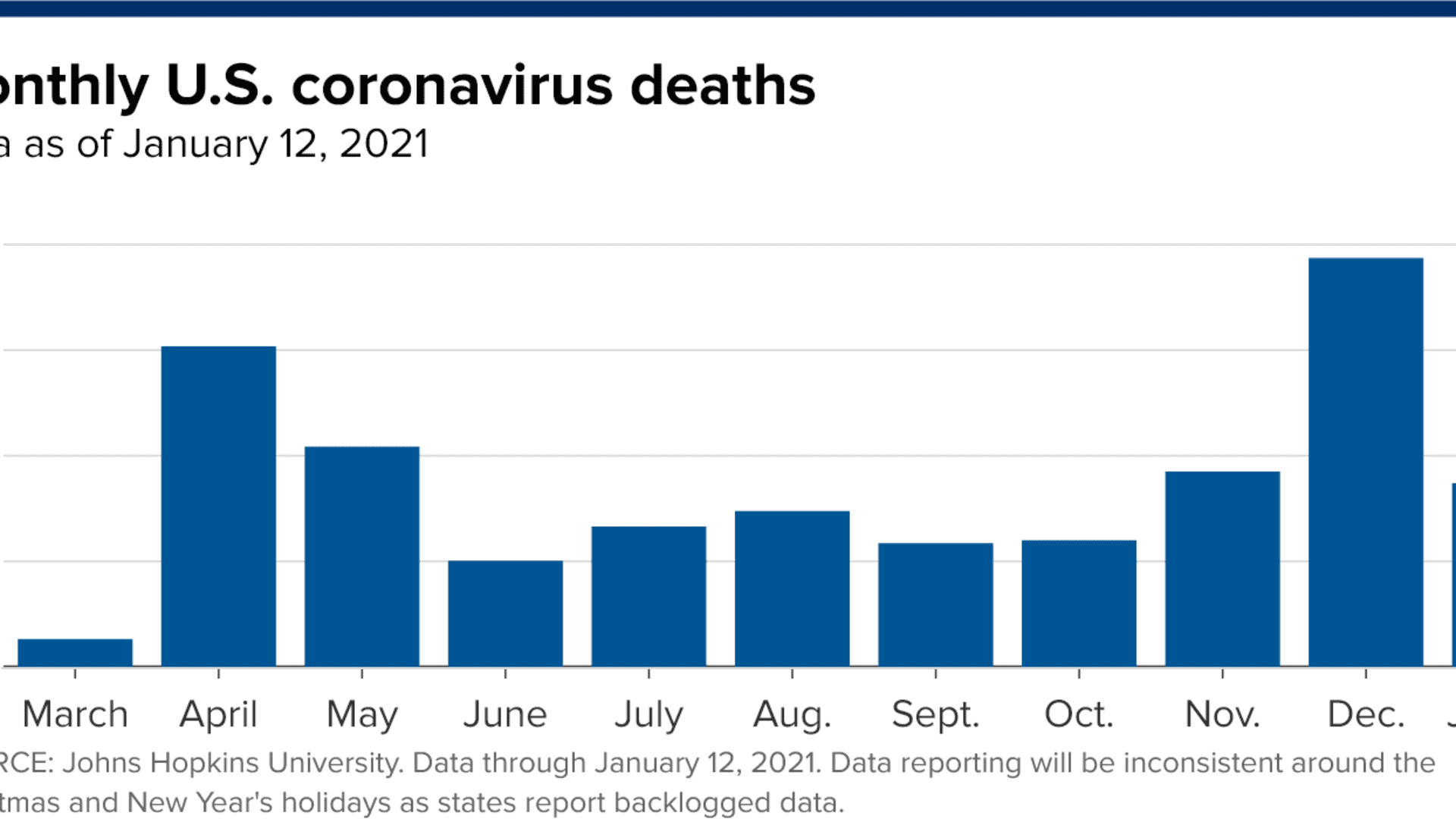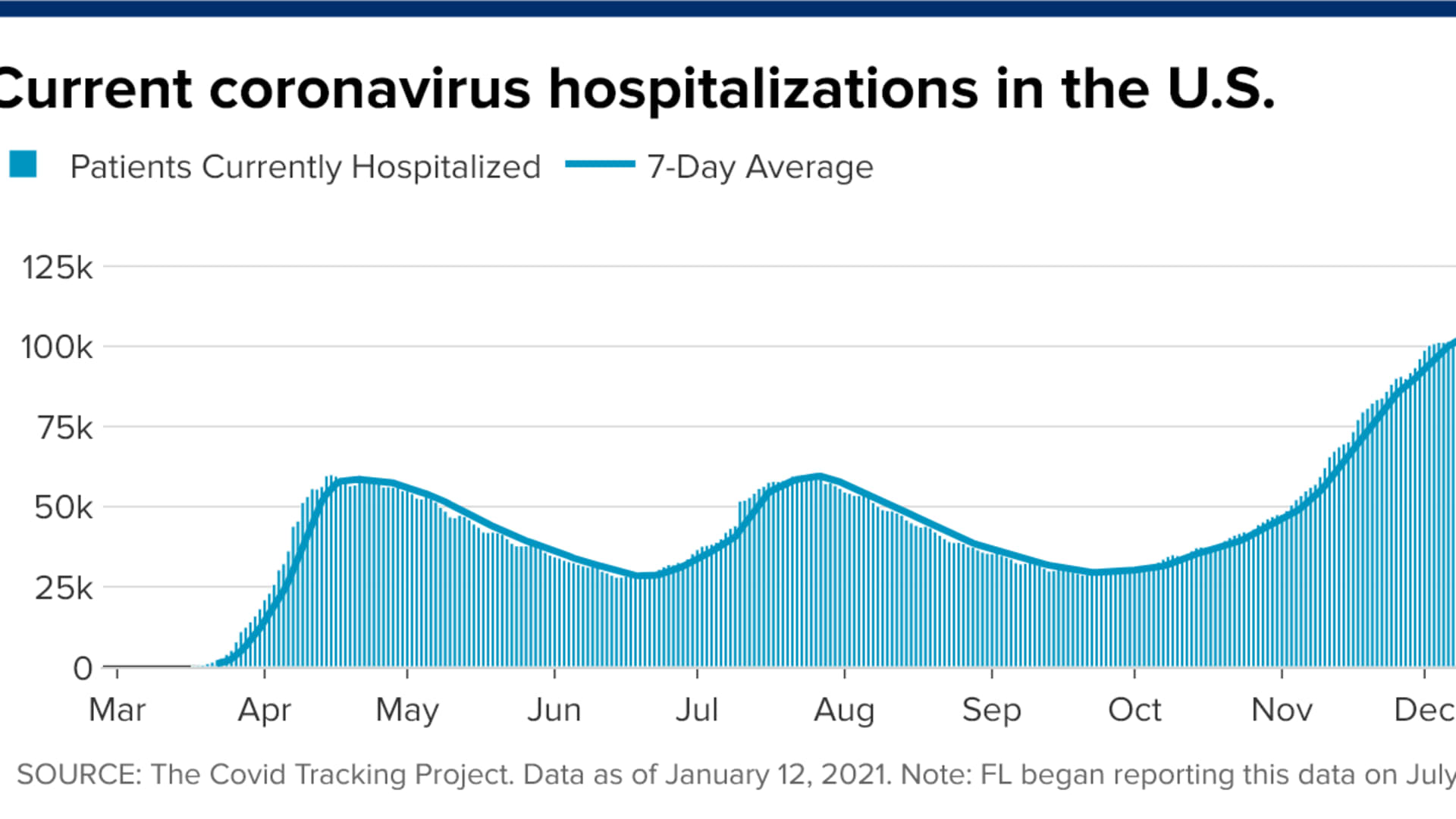
- The U.S. reported 4,327 coronavirus deaths Tuesday, the deadliest day of the pandemic so far. It's the second time in the last week Covid-19 deaths have exceeded 4,000 in one day.
- So far, more than 34,804 people have died in January, on track to become the deadliest month of the pandemic in the U.S.
- Researchers in Ohio say they have discovered two new variants that likely originated in the U.S.
A record 4,327 people died from Covid-19 in the U.S. on Tuesday, marking the deadliest day of the pandemic so far as the federal government tries to speed up the rollout of lifesaving vaccines. It comes as researchers in Ohio say they have found two new variants that likely originated in the U.S.
The new record is the second time in the last week that Covid-19 deaths have exceeded 4,000 in one day. It also pushes the nation's weekly average of deaths per day to 3,342 — a 26% increase compared with a week ago, according to a CNBC analysis of data compiled by Johns Hopkins University.
So far, 34,804 people have died in January, on track to become the deadliest month of the pandemic in the United States. Medical experts say the nation is now in its post-holiday surge, and the situation will likely worsen before it improves.

The U.S. has reported more than 22.8 million Covid-19 cases since the beginning of the pandemic, and cases are rising in a majority of states every day. As of Tuesday, the average number of new cases over the last week climbed by at least 5% in 36 states and Washington, D.C.
Money Report
"We were in a bad place even before the actual holidays came upon us," White House health advisor Dr. Anthony Fauci said Tuesday during the Schmidt Futures' Forum on Preparedness.
"We're in a very difficult situation, and it's getting worse," Fauci said. "I hope that as we get towards the end of January that we'll see a peaking and a turning around, particularly if people hang in there and don't get discouraged by Covid-19 fatigue and let down on their public health measures."

The record number of Covid-19 fatalities comes as the Trump administration — with just a week until President-elect Joe Biden takes office — tries to speed up the distribution of coronavirus vaccines from Pfizer and Moderna.
Researchers in Ohio say one of the two new variants they've discovered quickly became the dominant strain in Columbus, Ohio, over a three-week period in late December and early January.
Like the strain first detected in the U.K., the U.S. mutations appear to make Covid-19 more contagious but are not expected to diminish the effectiveness of the vaccines, researchers said.
The Centers for Disease Control and Prevention is reviewing the research on the new strains.
The CDC issued new guidelines Tuesday that expand vaccine eligibility to everyone 65 and older as well as to those with comorbid conditions, such as diabetes and heart disease.
U.S. officials said they will also stop holding back millions of doses reserved for the second round of shots of the two-dose vaccines. Until now, most states have focused on vaccinating health-care workers and nursing home residents, but that has created a backlog of people waiting to get the shots.
The U.S. has distributed more than 27.6 million doses of vaccines but has only administered roughly 9.4 million shots, according to data from the CDC. Fauci said the federal government was "a bit too rigid" when it limited the initial doses to only a small group of people, and the doses weren't dispensed as efficiently as they could have been.
"That's changed," Fauci said. "Right now, we're not going to abandon the prioritization, but when people are ready to get vaccinated, we're going to move right on to the next level so that there are not vaccine doses that are sitting in a freezer or refrigerator where they could be getting into people's arms."
New Jersey Gov. Phil Murphy told CNBC's "Squawk Box" on Wednesday that hospitals in his state were asking to vaccinate people beyond just their health-care workers. The governor told CNBC that although it hasn't been announced officially, New Jersey will likely allow people 65 years old and older to sign up for vaccinations in the coming days.
"We were already working toward that objective, and the CDC's blessing, the incoming Biden administration support for this, all of those converge. And we're going to take that step shortly," Murphy said.
New York Gov. Andrew Cuomo on Tuesday said his state would follow the CDC's new guidelines. Effective immediately, residents who are 65 and older can try to get vaccinated, he said, though he urged patience since supply will likely fall far short of demand.
"So you're telling people today, 'You're eligible,' but you're simultaneously telling people, 'We don't have enough dosages to get to you for the next six months,'" Cuomo said during a press briefing Tuesday. "Is that helpful? I don't think so. I think it creates more frustration and more anxiety."
— CNBC's Nate Rattner, Will Feuer and Berkeley Lovelace Jr. contributed to this report.






